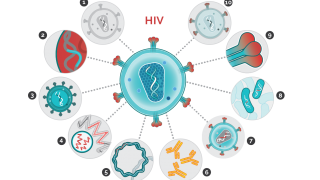Clinical Hold Lifted on HIV Monoclonal Antibody Development

CytoDyn Inc., a biotechnology company developing leronlimab, a CCR5 antagonist, announced that the U.S. Food and Drug Administration (FDA) has lifted its clinical hold on leronlimab.
According to a press release on February 29, 2024, the Company is now free to proceed with its proposed HIV clinical trial exploring leronlimab and its effects on chronic inflammation.
The FDA placed a partial clinical hold on the Company's HIV program on March 30, 2022.
CytoDyn's CEO, Dr. Jacob Lalezari, commented, "CytoDyn is grateful for the FDA's guidance on our (HIV) protocol, and we are excited to open a new chapter in the development of leronlimab as a therapy that provides clinical benefit by modulating chronic inflammation."
Leronlimab is a humanized monoclonal antibody that is a once-a-week subcutaneous injection that can also be administered intravenously.
However, it is not a traditional HIV vaccine candidate.
It is a competitive rather than allosteric inhibitor of the CCR5 receptor. This mechanism of action of binding competitively to the CCR5 receptor differentiates leronlimab from all other CCR5 antagonists.
The CCR5 receptor is a protein located on the surface of various cells, including white blood cells, stellate cells that produce scar tissue in the liver, and cells that undergo malignant transformation. It is the predominant co-receptor needed for certain strains of HIV to infect healthy T-cells.
The CCR5 receptor serves as a receptor for chemical attractants called chemokines. Chemokines are the key orchestrators of leukocyte trafficking by attracting immune cells to the sites of inflammation.
For HIV, leronlimab is a viral-entry inhibitor, protecting healthy T cells from viral infection by blocking the predominant HIV (R5) subtype from entering those cells.
Dr. Lalezari plans to host a webcast on Tuesday, March 5, 2024, to provide a Company update. The update will include discussing the Company's clinical trial goals and expectations, upcoming publications, and overall development strategy.
Our Trust Standards: Medical Advisory Committee























